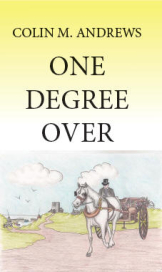
Cover by Annette Shilling
The Sequel to
A Matter Of Degree
Further humorous and dramatic events in the life of college friends Rob and Jake in the year following graduation
£7.00 (rrp £8.99)
Set in the mid-seventies, long before mobile phones and emails were part of everyday communication, One Degree continues the amusing and often unconventional exploits of Robert Kiddecott, a farmer's son from Devon, and his folk-singing friend, Jacob Moses, through the year following their graduation at a fictional teacher traing college in Mid Wales. Jake is taking a year's sabbatical as the newly elected President of the Students' Union while Rob has started his teaching career at a mixed grammar school in a nearby town.
Whatever creditable scheme Jake turns his hand to, the consequences are usually hilarious or bizarre, while Rob's relationships with female friends and colleagues take some unexpected turns. An old Ford Popular and a baby Fiat 500 add a critical role in the action
Review
Steve Thomason
There were people gathering in the small, 16th Century pub in the village (population 450) on the edge of Dartmoor when in walked this retired chemistry teacher, singer, musician and Morris dancer with his battered guitar and concertina; joining the dozen or so others there for an evening of music and song. No, this wasn’t the latest instalment in the ongoing saga of fictional Robert Kiddecott, this was where I managed to pick up “One Degree Over” from the hands of the author, the very same as mentioned above. Introducing a book review this way is to illustrate an important point: this author knows his subject matter inside and out. He’s writing a fictional story but it’s set in an environment with which he’s intimately familiar – and it shows.
It was good to catch up with the exploits of Robert Kiddecott. This book, still set in the mid-1970s, has the same ‘feel’ as the first: gentle humour, engaging characters and slightly bizarre exploits abound. Robert, folk musician and Morris dancer, has graduated from his college and is now employed teaching chemistry, still in mid-Wales. We meet many of the characters from the first novel, including Jacob Moses who continues to stumble, somewhat chaotically, through various schemes involving Robert in such unlikely events as greenhouses on roller-skates and instant ceilidh bands. Having drawn on his own experience of student life in 1960s/70s Wales to provide an authentic atmosphere in the first novel, the author now turns to his knowledge of teaching in the 1970s to produce the same authentic feel. Reading this book I could picture Ian Carmichael’s portrayal of ‘Lucky Jim’ in the 1957 film or his version of Bertie Wooster in the BBC series. You can’t help but like Robert Kiddecott, a decent but accident prone character who stumbles on regardless. I particularly identified with his clash with his Headmaster over unsupervised access to school science laboratories; one I’ve had myself on more than one occasion. It’s yet another indication that the author sets his characters against true to life backgrounds. My only reservation about the book’s authenticity is that, as with Robert’s undergraduate days, he seems to be surrounded by slightly less bizarre characters than I met on my similar path. Perhaps though, no-one would believe you these days if you told the truth about those times! What is true is that this is a book that you can sit down and enjoy. It’s light reading but very well written, gentle and engaging. You could probably read it in one sitting but I dipped into it over several days, so it would make a perfect book to take on holiday over the summer as well as one that could transport you to a gentler and more innocent world throughout a cold and rainy winter’s day.